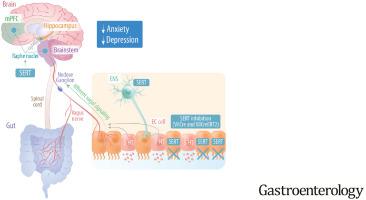当前位置:
X-MOL 学术
›
Gastroenterology
›
论文详情
Our official English website, www.x-mol.net, welcomes your
feedback! (Note: you will need to create a separate account there.)
Intestinal Epithelial Serotonin as a Novel Target for Treating Disorders of Gut-Brain Interaction and Mood
Gastroenterology ( IF 25.7 ) Pub Date : 2024-12-11 , DOI: 10.1053/j.gastro.2024.11.012 Lin Y. Hung, Nuno D. Alves, Andrew Del Colle, Ardesheer Talati, Sarah A. Najjar, Virginie Bouchard, Virginie Gillet, Yan Tong, Zixing Huang, Kirsteen N. Browning, Jialiang Hua, Ying Liu, James O. Woodruff, Daniel Juarez, Melissa Medina, Jonathan Posner, Raquel Tonello, Nazli Yalcinkaya, Narek Israelyan, Roey Ringel, Kara Gross Margolis
中文翻译:

肠上皮血清素作为治疗肠脑相互作用和情绪障碍的新靶点
情绪障碍和 DGBI 非常普遍,通常是共病,并且缺乏完全有效的疗法。尽管 SSRI 是这些疾病的一线药物治疗,但它们可能会产生不良反应,包括焦虑、快感缺乏、运动障碍,并且在子宫内暴露的儿童中,认知、情绪和胃肠道疾病的风险增加。SSRIs 全身作用,阻断 SERT 并增强大脑、肠上皮和肠道神经元中的血清素能信号传导。然而,介导 SSRI 治疗和不良反应的隔室尚不清楚,妊娠 SSRI 暴露是否直接导致人类 DGBI 的发展也尚不清楚。
我们利用转基因、手术和药理学方法来研究肠上皮 SERT 或 5-羟色胺对情绪和胃肠道功能以及相关沟通途径的影响。我们还进行了一项前瞻性出生队列研究,以评估妊娠 SSRI 暴露对 DGBI 发育的影响。
针对肠上皮的 SERT 消融促进抗焦虑和抗抑郁样作用,而不会对胃肠道或大脑造成不利影响;相反,上皮 5-羟色胺合成抑制增加了焦虑和抑郁样行为。发现传入迷走神经通路是肠上皮血清素影响行为的管道。子宫内 SSRI 暴露是出生后第一年发生 DGBI(功能性便秘)的重要且特定的危险因素,与产妇抑郁症状无关。
这些发现为胃肠道如何调节情绪行为提供了基本见解,揭示了一种新的肠道靶向情绪调节治疗方法,并表明子宫内 SSRI 暴露与 DGBI 发展之间存在人类的新联系。
更新日期:2024-12-12
Gastroenterology ( IF 25.7 ) Pub Date : 2024-12-11 , DOI: 10.1053/j.gastro.2024.11.012 Lin Y. Hung, Nuno D. Alves, Andrew Del Colle, Ardesheer Talati, Sarah A. Najjar, Virginie Bouchard, Virginie Gillet, Yan Tong, Zixing Huang, Kirsteen N. Browning, Jialiang Hua, Ying Liu, James O. Woodruff, Daniel Juarez, Melissa Medina, Jonathan Posner, Raquel Tonello, Nazli Yalcinkaya, Narek Israelyan, Roey Ringel, Kara Gross Margolis

|
Background & Aims
Mood disorders and DGBI are highly prevalent, commonly co-morbid and lack fully effective therapies. Although SSRIs are first line pharmacological treatments for these disorders, they may impart adverse effects including anxiety, anhedonia, dysmotility and, in children exposed in utero, an increased risk of cognitive, mood and gastrointestinal disorders. SSRIs act systemically to block SERT and enhance serotonergic signaling in the brain, intestinal epithelium and enteric neurons. Yet, the compartments that mediate the therapeutic and adverse effects of SSRIs are unknown, as is whether gestational SSRI exposure directly contributes to human DGBI development.Methods
We utilized transgenic, surgical, and pharmacological approaches to study the effects of intestinal epithelial SERT or serotonin on mood and gastrointestinal function, as well as relevant communication pathways. We also conducted a prospective birth cohort study to assess effects of gestational SSRI exposure on DGBI development.Results
SERT ablation targeted to the intestinal epithelium promoted anxiolytic and anti-depressive-like effects without causing adverse effects on the gastrointestinal tract or brain; conversely, epithelial serotonin synthesis inhibition increased anxiety and depression-like behaviors. Afferent vagal pathways were found to be conduits by which intestinal epithelial serotonin affects behavior. In utero SSRI exposure is a significant and specific risk factor for development of the DGBI, functional constipation, in the first year of life, irrespective of maternal depressive symptoms.Conclusion
These findings provide fundamental insights into how the gastrointestinal tract modulates emotional behaviors, reveal a novel gut-targeted therapeutic approach for mood modulation and suggest a new link in humans between in utero SSRI exposure and DGBI development.中文翻译:

肠上皮血清素作为治疗肠脑相互作用和情绪障碍的新靶点
背景和目标
情绪障碍和 DGBI 非常普遍,通常是共病,并且缺乏完全有效的疗法。尽管 SSRI 是这些疾病的一线药物治疗,但它们可能会产生不良反应,包括焦虑、快感缺乏、运动障碍,并且在子宫内暴露的儿童中,认知、情绪和胃肠道疾病的风险增加。SSRIs 全身作用,阻断 SERT 并增强大脑、肠上皮和肠道神经元中的血清素能信号传导。然而,介导 SSRI 治疗和不良反应的隔室尚不清楚,妊娠 SSRI 暴露是否直接导致人类 DGBI 的发展也尚不清楚。
方法
我们利用转基因、手术和药理学方法来研究肠上皮 SERT 或 5-羟色胺对情绪和胃肠道功能以及相关沟通途径的影响。我们还进行了一项前瞻性出生队列研究,以评估妊娠 SSRI 暴露对 DGBI 发育的影响。
结果
针对肠上皮的 SERT 消融促进抗焦虑和抗抑郁样作用,而不会对胃肠道或大脑造成不利影响;相反,上皮 5-羟色胺合成抑制增加了焦虑和抑郁样行为。发现传入迷走神经通路是肠上皮血清素影响行为的管道。子宫内 SSRI 暴露是出生后第一年发生 DGBI(功能性便秘)的重要且特定的危险因素,与产妇抑郁症状无关。
结论
这些发现为胃肠道如何调节情绪行为提供了基本见解,揭示了一种新的肠道靶向情绪调节治疗方法,并表明子宫内 SSRI 暴露与 DGBI 发展之间存在人类的新联系。






























 京公网安备 11010802027423号
京公网安备 11010802027423号